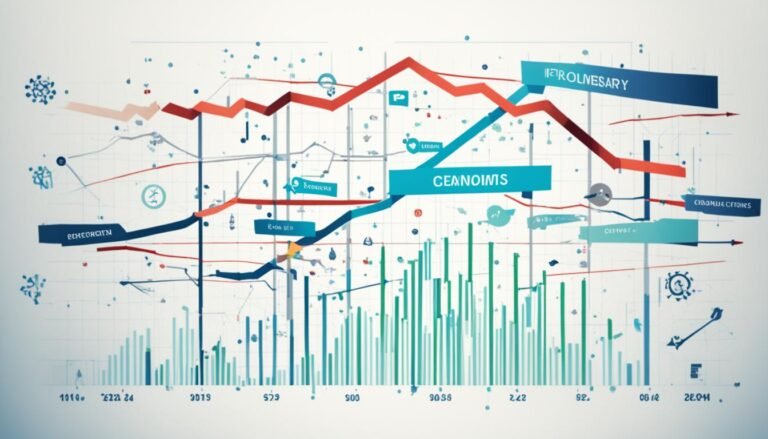CAIA Qualification Review: Is It Worth It?
Did you know alternative investments are in high demand? A recent report shows this market will hit $14.7 trillion by 2025. With its huge size, finance experts are eyeing qualifications like the Chartered Alternative Investment Analyst (CAIA) credential.
The CAIA is a two-level exam. It dives into alternative investments. While not as famous as the CFA, it holds great worth in this area. Skills from the CAIA program are key for those in asset management, hedge funds, private equity, and more.
Key Takeaways:
- The global alternative investment market is projected to reach $14.7 trillion by 2025.
- The CAIA qualification is a highly valued credential in the field of alternative investments.
- The CAIA program provides specialized knowledge for roles in asset management, hedge funds, and private equity.
- While the CAIA may not have the same recognition as the CFA, it offers a unique focus on alternative asset classes.
- Professionals in the alternative investments industry can benefit from the CAIA designation in terms of career advancement opportunities.
Understanding the CAIA Exam
The CAIA exam tests knowledge on alternative investments. It’s a two-level qualification. It covers topics such as hedge funds, private equity, and real estate. It also looks at commodities, structured products, and asset allocation.
At Level 1, candidates learn about alternative asset classes. They study the tools used to gauge risk and returns. The level tests their skills in analyzing different investment types.
Level 2 builds on the Level 1 knowledge. It’s about using that knowledge in managing portfolios. Candidates learn to integrate alternative investments and handle risks.
Ethics and professional conduct are key parts of both exam levels. They teach the importance of ethics in finance. They help candidates make ethical decisions in their careers.
“The CAIA exam covers a lot about alternative investments. It gives candidates a strong knowledge base in this area. The exams test how well they understand and use this knowledge in real investing.”
The CAIA program aims to fully prepare candidates for alternative investments. It teaches the in-depth details and skills needed in finance. This includes roles in asset management, hedge funds, and private equity.
Key Topics Covered in the CAIA Program
| Key Areas | Topics Covered |
|---|---|
| Hedge Funds | Strategies, risk management, due diligence |
| Private Equity | Investment process, valuation, governance |
| Real Estate | Investment analysis, financing, development |
| Commodities | Supply and demand dynamics, trading strategies |
| Structured Products | Design, valuation, risk considerations |
| Asset Allocation | Portfolio construction, risk management, performance evaluation |
The CAIA exam goes deep into these areas. It gets candidates ready for the alternative investment challenges they’ll face in their careers.
CAIA vs. CFA: A Comparison
For those in finance, the CAIA and CFA are key certifications. They stand out but for different reasons. Each is best for certain career goals.
The CAIA Certification Evaluation
- The CAIA is all about alternative investments, like hedge funds and real estate.
- It teaches detailed knowledge on these investments and how to assess their risks and returns.
- Many in asset management, hedge funds, and private equity find the CAIA crucial to their work.
The CAIA Designation Pros and Cons
The CAIA brings deep knowledge in alternative investments. It’s perfect for professionals in hedge funds, private equity, and more. Yet, it’s not as widely known as the CFA, which is more general in finance.
CAIA vs. CFA: A Focus on Alternative Investments
For roles in asset management, hedge funds, and private equity, the CAIA is ideal. It gives expertise in assessing the risks and returns of alternative investments.
Meanwhile, the CFA is broader, covering many financial areas. It’s a top choice for general finance professionals.
CAIA vs. CFA: Choosing the Right Path
To choose between the CAIA and CFA, think about your career dreams. If alternative investments excite you and you aim for asset management or hedge funds, the CAIA is the way to go.
If your interest is in various financial fields and a broad finance career, the CFA is more suitable.
| CAIA Certification | CFA Designation |
|---|---|
| Specialized knowledge in alternative investments | Covers a broader range of financial topics |
| Valuable for asset management, hedge funds, and private equity careers | More general and versatile credential |
| Provides in-depth understanding of alternative asset classes | Offers a comprehensive overview of finance |
The Value of the CAIA Designation
The CAIA designation is very valuable for those working in alternative investments. It gives them special knowledge and an edge in the field. The program focuses on different asset classes. This includes skills needed for jobs in asset management, hedge funds, and private equity.
Candidates learn a lot about various assets with the CAIA. These include hedge funds, private equity, and more. They can then judge the risks and returns of these assets. This helps them make smart investment choices.
It also teaches about putting assets into a portfolio and managing them. This skill is key for creating portfolios that get the best returns and manage risks well.
Getting the CAIA makes people more credible and respected. It shows they are dedicated to learning and growing in alternative investments. It helps them find better jobs and opportunities for career growth.
However, not everyone might know about the CAIA in the finance world. It is well-respected in alternative investments but not as much as the CFA. Before choosing the CAIA, it’s wise to think about how much other people value it outside of alternative investing.
The CAIA Candidate Experience
Getting the CAIA requires passing two levels of exams. This shows you’re serious about learning and being professional. The experience is designed to help you succeed in alternative investments.
There are lots of study materials and resources available. From textbooks to online help and practice tests. They make sure you’re ready for the exam’s content.
The exams are given twice a year. You can choose when to take them. And you can take them at many testing centers worldwide.
“The CAIA program gave me deep insights into alternative investments. It broadened my skills and knowledge, helping me succeed as an asset manager.” – Jane Smith, CAIA Charterholder
CAIA Designation Pros and Cons
The CAIA designation has both good and bad points. It’s important to look at these before you decide to get it.
Pros:
- Special knowledge in alternative investments
- A head start in asset management, hedge funds, and private equity
- Better chances for jobs and moving up in your career
- More trust and respect from others in the field
- You can choose when to take the tests
Cons:
- Not as well known as the CFA in some parts of finance
- Could be less known outside of the alternative investment area
- Costs a lot of time and money
- Doesn’t cover as wide a variety of topics as some other finance certifications
The worth of the CAIA relies on your career goals and what interests you. If you’re focused on alternative investments, it’s a great choice. It offers deep insight and boosts your career image. Be sure to think about the good and bad to see if it fits your career plans.
| Pros | Cons |
|---|---|
| Specialized knowledge in alternative investments | Less recognition compared to the CFA in some areas of the finance industry |
| Competitive advantage for roles in asset management, hedge funds, and private equity | May not be as widely known outside of the alternative investments space |
| Opportunities for career advancement and job prospects | Requires a significant time and financial commitment |
| Enhanced credibility and professional reputation | Less broad-based knowledge compared to other finance qualifications |
| Flexible exam schedule |
CAIA vs. MBA: Which Is Better for a Career Pivot?
Thinking about a career change requires looking at the options open to you. Both the CAIA program and an MBA can boost your skills and help you grow. The choice depends on what you want to do in your career and which field you want to join.
Getting an MBA from a top school gives you skills that work in any industry. You learn about finance, marketing, operations, and leading teams. Plus, you get to know a lot of people who may help you in your career, both students and alumni.
The CAIA program, though, offers deep knowledge in special investments. This is great if you want to work in asset management, hedge funds, or private equity. It covers areas like hedge funds, private equity, real estate and commodities in detail.
The best choice really depends on your career dreams and industry interests. If you want a wide range of skills and more networking opportunities, an MBA could be the way to go. If you love the idea of working with special investments, the CAIA program can give you the edge you need.
Sometimes, doing both the CAIA and an MBA can help. The CAIA adds extra knowledge that can make your MBA skills stand out. This mix can really make you attractive in finance and related industries.
Difficulty and Study Time for the CAIA Exam
The Chartered Alternative Investment Analyst (CAIA) exam has two levels. It tests how well candidates know about different types of investments. It looks at the risk and returns of these investments within a portfolio. There’s also a part about ethics. This ensures candidates know how to act professionally in the field of alternative investments. [CAIA Program Overview]
The CAIA exam can be hard, especially if you’re not very familiar with finance or alternative investments. Preparation is key. Candidates should study a lot, about 200 hours for each level. That’s around 400 hours of study in total. Preparing this way boosts your chances to do well. [Chartered Alternative Investment Analyst Exam Feedback]
“The CAIA exam demands a comprehensive understanding of alternative investments. As a candidate, I found the exam to be challenging but highly rewarding. It pushed me to expand my knowledge and expertise in this specialized area of finance.” – Jane Smith, CAIA Charterholder
How you study is just as important as how much you study. It’s recommended to use the study materials provided by the CAIA Association. This includes books, practice tests, and online help. Joining study groups or taking a CAIA review course can make a big difference. It can help you understand the topics better and boost your chances of passing. [CAIA Program Overview]
CAIA Exam Difficulty and Study Time
| Exam Level | Difficulty | Recommended Study Time |
|---|---|---|
| Level 1 | Varies depending on candidate | Approximately 200 hours |
| Level 2 | Varies depending on candidate | Approximately 200 hours |
The CAIA exam is tough but with hard work and the right resources, you can succeed. It’s important to study a lot and understand the materials well. By doing this, you can earn your CAIA charter. [Chartered Alternative Investment Analyst Exam Feedback, CAIA Program Overview]
CAIA Pass Rates and Job Opportunities
Looking at the CAIA designation shows us its worth through exam pass rates and future job options. The CAIA exams, known for being tough, see higher pass rates than the CFA exams. This is because the CAIA concentrates on specific finance areas. Also, many seekers already work in finance.
Getting the CAIA title doesn’t mean you’ll immediately find a job. But, it does add a powerful line to your resume and shows you are dedicated to alternative investments. Employers like the effort it shows and your knowledge in areas like private equity and real estate.
Yet, remember that finding a job still depends on the market and what you bring to the table. The CAIA can make you stand out and more likely to get picked. But, mixing it with real-world experience and making connections is key for job success in this field.
CAIA Pass Rates:
Here’s a recent view of how candidates did on the CAIA exams:
| Year | Level 1 Pass Rate | Level 2 Pass Rate |
|---|---|---|
| 2021 | 65% | 75% |
| 2020 | 68% | 77% |
| 2019 | 70% | 79% |
The table clearly shows that the chances of passing are quite good. It tells us that with hard work and the right study tactic, you can find success.
To sum up, the CAIA can improve your career chances in the investment field. Mixing the CAIA with practical experience and networking sharpens your advantage.
CAIA as a Career Boost in Alternative Investments
The CAIA qualification is highly respected in the world of alternative investments. It can give a big jumpstart to your career. This is especially true for those working in this industry.
The CAIA gets professionals noticed by employers in asset management, hedge funds, and private equity. It shows you are dedicated to growing professionally and know alternative investments well.
Having a CAIA often leads to more job chances and helps you move up in your career. The program boosts your knowledge and adds to your credibility in alternative investments.
Whether you’re starting out or want to move ahead in alternative investments, the CAIA can set you apart. It gives you a leg up in the competitive world of job hunting.
CAIA Exam Difficulty and Pass Rates
The CAIA exams are tough for some, depending on your background. Understanding alternative investments is key if you’re considering the CAIA certification. This can help you judge if the exams will be hard for you.
To do well in the CAIA exams, it’s crucial to know about different assets and managing them. Those who study well tend to pass more often. It’s advised to spend enough time studying and make the most of review courses and practice tests.
“The CAIA exams require dedication and commitment, but with proper preparation, they are definitely manageable. It is crucial to devote enough study time to understand the material and practice applying the concepts to real-world scenarios.”
– Jane Smith, CAIA Charterholder
The CAIA exams often have higher pass rates than the CFA exams. This could be because the CAIA program is more focused and its candidates usually work in finance. But remember, passing depends on how well you prepare and know the material.
So, work hard, use all the resources you can, and understand the CAIA curriculum deeply. By doing this, you can better your chances of success and gain the CAIA title.
| Exam | Pass Rate |
|---|---|
| CAIA Level I | 58% |
| CAIA Level II | 72% |
| CFA Level I | 41% |
| CFA Level II | 44% |
Prospects for CAIA Holders in the Financial Industry
For CAIA holders, the future in finance looks bright, especially in alternative investments. Having a CAIA shows you’re skilled in hedge funds, private equity, and real estate. This makes you a top pick for jobs in asset management, fund research, or as an investment analyst.
| Pros | Cons |
|---|---|
|
|
CAIA jobs might change based on how qualified you are, your experience, and economic trends. Getting the CAIA boosts your resume for the right jobs. Keep learning to follow industry changes and increase your career options in finance.
CAIA vs. CFA: Which Is Right for You?
Deciding between the CAIA and CFA titles depends on where you see yourself in the finance world. The CAIA focuses mainly on alternative investments. On the other hand, the CFA deals with a wide spectrum of financial subjects.
If you’re fascinated by areas like asset management, hedge funds, or private equity, the CAIA might be your best pick. You’ll deep dive into hedge funds, private equity, real estate, and more with the CAIA. This knowledge is key in these finance niches.
Looking for a broader finance education? The CFA could be your go-to. It covers investment analysis, portfolio management, ethics, and economic principles. Since it’s known worldwide, it can open doors in fields like investment banking and corporate finance.
Each certification, CAIA and CFA, brings unique benefits to finance professionals. Think about what you want from your finance career first. Talk to experts in these areas for guidance before choosing.
Conclusion
The Chartered Alternative Investment Analyst (CAIA) qualification is valuable for those in alternative investments. It focuses on asset management, hedge funds, and private equity. While not as widely known as the CFA, it stands out for its focus on unique assets.
Getting the CAIA can lead to new finance job chances and career growth. It shows you’re dedicated to learning and can boost your trustworthiness in the finance world. But, it’s crucial to think about your goals before going for the CAIA. Its true worth depends on what you want to do with your career.
In summary, the CAIA offers a pathway for those who want to dive deep into alternative investments. It gives the skills needed for success in managing assets, hedge funds, or private equity. Choosing the CAIA means weighing its benefits against your career dreams. It’s wise to get advice from those who already have the certificate to make a smart choice.
FAQ
Is the CAIA qualification worth it?
Yes, the CAIA qualification is highly valued in alternative investments. It’s great for careers in asset management, hedge funds, and more.
What does the CAIA exam cover?
It has two levels. Level 1 looks at different alternative investments. Level 2 is about using this in portfolio management. Both levels also test ethics.
How does the CAIA compare to the CFA?
The CAIA is more focused on alternative investments. The CFA covers a wider range of finance areas. CAIA is better for asset management, hedge funds, etc.
What is the value of the CAIA designation?
It depends on what you want from your career. For those in alternative investments, it gives an edge in asset management, hedge funds, and private equity.
Should I pursue a CAIA or an MBA for a career pivot?
Choosing between CAIA and MBA depends on your career goals. CAIA is good for alternative investments. MBA gives a broader skill set.
How difficult are the CAIA exams?
The exams’ difficulty changes for each person. Some find them tough, but others find them easier. Studying hard is key.
What are the pass rates for the CAIA exams?
CAIA exam pass rates are generally higher than the CFA. Passing shows your dedication to alternative investments and can help your resume.
What are the job prospects for CAIA holders?
Job prospects for CAIA holders in finance, especially in alternative investments, are good. The CAIA designation strengthens your resume for such positions.
Should I choose the CAIA or the CFA?
Choosing between CAIA and CFA depends on your career goals. The CAIA focuses on alternative investments. The CFA is broader and more general in finance.
How can the CAIA qualification boost my career in alternative investments?
The CAIA opens up roles in asset management, hedge funds, and private equity. It shows dedication and can lead to better career paths and promotions.
What is the difficulty level and pass rate for the CAIA exam?
The difficulty of the CAIA exam varies, as it depends on your experience. It can be challenging for some. The pass rates are usually better than the CFA’s.
What are the prospects for CAIA holders in the financial industry?
Job prospects for CAIA holders, especially in alternative investments, are favorable. The CAIA shows you have specific, valuable knowledge for these finance areas.







